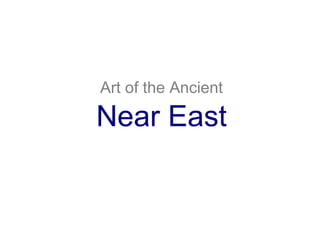
Ancient Near East
- 1. Art of the Ancient Near East
- 2. Mesopotamia “Land between the rivers” The Ancient Near East stretched from the Mediterranean Sea to the Persian Gulf (Modern Jordan, Israel, Lebanon, Syria, central Turkey, Iran, and Iraq)
- 3. Mesopotamia was ideal for agriculture , and farming communities arose around 9000 BCE Major city-states include Elam, Sumer, Akkad, Lagash, Babylonia, Anatolia, and Assyria Near East traded with Egypt People worshipped numerous Gods and Goddesses
- 4. Sumerian Art
- 5. Accomplishments of the Sumerians invention of writing (cuneiform) cities laws architecture pottery (invention of potter’s wheel) weaving metalwork
- 6. Votive Statues of Worshippers
- 7. Votive Statues of Worshippers 2900 – 2350 BCE gypsum, shell, black limestone various heights (tallest 30 in. high) Statues possibly commissioned by regular people for the afterlife Hundreds of these sculptures have been found Figures are praying with hands together, sometimes holding a cup or vegetation Found in groups in excavated temples
- 8. Warka Vase
- 10. Reconstruction Drawing of Anu Ziggurat Architecture (Temple) 3100 BCE Located in Ancient Uruk (modern Warka, Iraq)
- 11. Anu Ziggurat Sumer , one of the Ancient Near East City-States built Ziggurats, a type of temple Temple raised up closer to the Gods (and to protect from floods) The buildings used a stepped pyramid shape Ziggurats showed the wealth and power of the Sumerians
- 14. Akkadian Art
- 17. Neo-Sumerian Art
- 18. Votive Statue of Gudea Sculpture (Carved Stone) 73.7 cm Tall 2120 BCE
- 19. Votive Statue of Gudea Votive – Type of Offering to the Gods Statue – Sculpture usually of a Human Figure Gudea was the leader of Lagash (modern Telloh, Iraq) Strong, Peaceful Leader
- 20. Babylonian Art
- 21. Stele of Hammurabi Sculpture (carved stone / relief) 2.13 Meters Tall 1792 – 1750 BCE
- 22. Hammurabi – King of Ancient Babylon Stele – Vertical Upright Monument Contains early set of written laws Written in Cuneiform writing (writing developed in Near East) Conversation between Hammurabi and Shamash , the sun God (God given laws) Stele of Hammurabi
- 24. Assyrian Art
- 25. Lamassu
- 27. Reconstruction Drawing of citadel of Sargon II , Khorsabad, 720 BCE
- 28. Assurnasirpal II Killing Lions Relief (carved Stone) 99.1 cm Tall 850 BCE
- 29. Assurnasirpal II Killing Lions Lion hunting scene (Theme of Man and Nature) Assurnasirpal II was the leader of Assyria Assyrian ruler built huge palaces – these palaces were decorated with relief carvings
- 30. Neo-Babylonian Art
- 31. Ishtar Gate From Babylon Architecture (Glazed Brick) 575 BCE
- 33. Ishtar Gate Ishtar Gate From Babylon Architecture (Glazed Brick) 575 BCE Entrance to the Ancient city of Babylon Lions – Symbols of Goddess Ishtar Crenellated Towers Glazed Bricks used to make the gate are long lasting and strong
- 34. Persian Art
- 35. Persepolis
- 36. Persepolis
- 37. Persepolis Palace of Darius I and Xerxes I Persepolis, Iran 500 BCE Buildings separated by streets and open spaces Columned hall was dominant structure Standing on a rock cut platform Stone used throughout the palace Forms of figures derived from Egyptian style (Persians traded with the Egyptians) Destroyed by Alexander the Great (leader of Macedon – Northern Greece)
